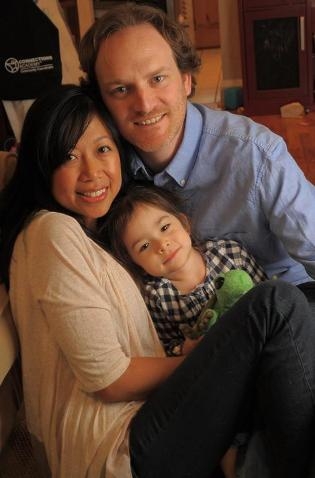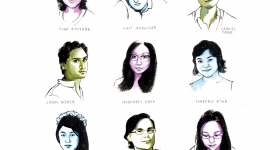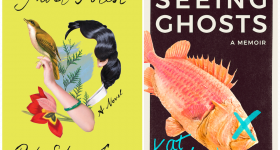I don’t usually read memoirs. For the most part, I distrust memoirs in the way that any person should distrust a half-baked pickup line delivered in some seedy dive. The handful that I've read have tended to (a) evince extreme narcissism by the author, or (b) have an offensively blatant self-promoting agenda. I muttered “amen” under my breath when New York Times books section columnist Neil Genzlinger bitched about how too many people who lead lives too insignificant manage to get books published.
So why did I pick up Moonface by Angela Balcita? Well, the back cover blurb says that the book is about the author’s experience with a kidney transplant, and it so happens that someone very close to me underwent one. That person, my best friend, was very mum about her whole experience. In fact, through her year-long ordeal of dialysis, searching for a donor, and surgery, we never talked much about her disease (which is more telling, I think, of the unspeakable difficulty of the experience rather than any lack of trust between us). So, wanting to know more of what my best friend went through, I started reading Balcita's book.
The thing, though, is that Balcita's book didn't really help me experience vicarious pain as I was expecting it to. This was no grab-your-tissues pity party. There were no long-drawn complaints about pain or fatigue, nor any extensive forays into the medical or physiological makings of kidney disease. Balcita explains her condition in one quick paragraph:
My kidney was no longer working, which meant that it could no longer regulate my blood pressure and clean my blood of toxins and waste. Eventually, I’d stop urinating, which meant my body was starting to hold on to liquid -- swelling first my ankles and my hands, and then eventually flooding my whole body. My kidney had been working twenty-four hours a day to clean my blood, and now that it couldn’t do that, I needed a machine to do that work for me. That treatment was called dialysis, during which long tubes would pull the blood from me, run it through the machine to clean it, and drain it back into my veins.
Instead of the depressing book I had anticipated, the book ended up being a fun and almost light-hearted read. And with chapter titles like “Direct from the Land of Fantastical Scenarios, the Greatest and Most Sensational Tragicomedians in the World,” and “The Inquisitor, the Pain Inflictor, and a Special Guest Appearance by the Blinding Truth,” one can’t help but appreciate Balcita’s ability to balance gravity with humor, and vulnerability with resilience. The best part, of course, is that the book is a love story, a really believable and uncorny one, one that is as cute and funny as it is a testament to the possibility of truly unconditional love.

Author Angela Balcita with her husband Charlie O'Doyle and daughter Nico
The storyline is a simple one: boy meets girl, girl meets boy, boy donates his kidney. Two years after she’s had her first kidney transplant from her brother as a college freshman, Balcita meets her man Charlie O’Doyle at a costume party (dressed as Elvis, his pick up line was, “Priscilla, that you?”). He soon gives Balcita her nickname after reading the possible side-effects listed on one of her medicine bottles which included a “moon-face complexion.” Balcita’s transplant fails after they start dating, at which point O’Doyle offers his kidney (in a much quicker fashion than he got around to proposing marriage). The book follows the ups and downs in the couple’s lives as they heal from the transplant, move to different cities from San Francisco to Iowa where Balcita completes her MFA, and start a family.
The tricky thing about memoirs is that, quality of writing and character/plot development aside, the reader can’t help but also evaluate the author’s life and make judgments upon the decisions and actions she’s made. And in this respect, I am critical of Balcita’s insistence on getting pregnant. Against doctor’s orders (“bullshit,” she counters), she decides against adoption and a surrogate, choosing instead to risk her second transplant from Doyle to have a baby. Her transplant from Doyle does end up failing, and her daughter Nico (nicknamed “Birdie”) is born two months premature and weighing in at only two pounds. Balcita tries to frame her desire for a child as an act of daring (“Clearly these doctors don’t know with whom they are dealing,” she says), but given her precarious life span, the real possibility of her child growing up motherless, and the great burden Doyle might someday have to cope with, I want to call out Balcita for being selfish.
Balcita does develop misgivings, but it comes so much later in the book that it fails to be totally convincing:
I am a greedy girl. I should have been thankful enough not just for one transplant but for two. But no, I wanted more. I don’t know how I thought I could give birth and get to walk away without a scratch, without putting Birdie, me, or Charlie’s kidney in danger.
And only after Balcita observes the frail health of her baby does she worry about her daughter’s future (“What could she do at two pounds? Did I bring her into this world at a disadvantage?").
Thankfully, the family goes on to lead a healthy life after Balcita receives a third kidney transplant from a friend she met at graduate school. And in the end, one can’t help but cheer for the family and admire their determination. I found much comfort in Balcita’s conviction that kidney disease can be surmounted, and grew much more inspired by my own best friend’s tenacity.
To learn more about kidney donation, visit the National Kidney Foundation website: www.kidney.org.










Comments